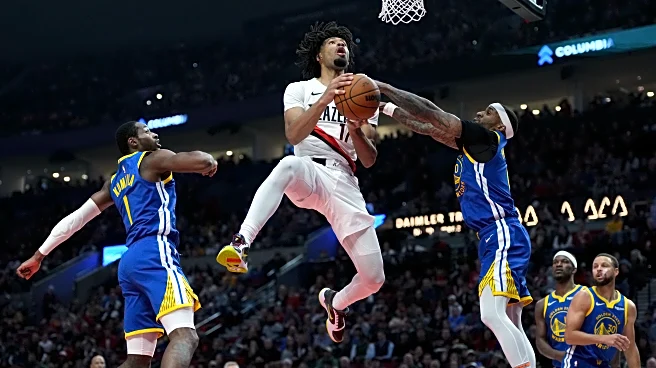Before Friday night’s game against the Portland Trail Blazers, many people — myself included — warned about the dangers of the trap game for the Golden State Warriors. The spirit of those concerns might
have been accurate, but the specifics were not.
The Warriors got blown out by the Blazers 139-119, earning their first loss of the year. But it wasn’t because it was a trap game, which would entail the Dubs overlooking their inferior opponent and paying the price. Instead, the Warriors were handed a one-sided defeat for a more defensible reason — one that we all should have seen coming.
Golden State, one of the oldest teams in the league, began the season on Tuesday, on the road. They returned to San Francisco to play on Thursday, in a tense game that went into overtime. That game ended, and they headed straight to the airport and flew to Oregon. Roughly 21 hours after their extra-period affair ended, they were playing the Blazers on the road.
Portland, one of the youngest and most athletic teams in the league, began the season on Wednesday, at home. They had Thursday off, at home. They played the Warriors on Friday, at home, and rested.
This was not a case of the Warriors overlooking their opponent or forgetting to show up to the arena. It was simply a case of one team having far more energy than the other, and then compounding it by having an uncharacteristically hot shooting night.
The Dubs debuted a new starting lineup, replacing Brandin Podziemski with Quinten Post, seemingly in an effort to not wear out Draymond Green too much (and made easier by the fact that Podziemski has gotten off to a low start). At first, the lineup struggled, with Green committing turnovers on the first two possessions of the game. And then they started to figure things out, in a hurry. The offense got some clean looks and the Dubs were playing with remarkably active hands on defense, and rattled off a 9-0 run en route to an early 12-4 lead.
That was the end of the good times in this game. Golden State kept getting good looks but the shots weren’t falling, and the Blazers were getting to the rim at ease. The Warriors point of attack defense was very poor, and their help defense in the paint was worse still, and that trend continued until the final buzzer rang. It didn’t take long for the Blazers to nearly erase the entire deficit, but the Warriors had some fight in them, as Steph Curry went off for 16 points in his initial stint, as the team pushed the lead back to eight points.
Steve Kerr tried to counter Portland’s rest and athleticism advantage by countering with a young and athletic lineup. Late in the first he turned to a rotation of Brandin Podziemski, Will Richard, Moses Moody (who was making his season debut), Jimmy Butler III, and Trayce Jackson-Davis, with two-way player Pat Spencer replacing Jackson-Davis as the quarter came to a close. Unfortunately, what that lineup had in exuberance they lacked in ability, and the Blazers went on a late 9-1 run, tying the game as we went to the second quarter.
If the cracks showed in the first quarter, the building fell apart in the second. With an opening lineup of Podziemski, Butler, Post, Buddy Hield, and Draymond Green, the Warriors got into a back-and-forth with the Blazers that was equal parts sloppy and frantic for both teams. That didn’t favor the older, more tired team, and Portland held serve with a modest lead. The Dubs finally started to make a run when they turned to a small lineup — which featured Jonathan Kuminga at the five — but late in the half everything clicked for the Blazers. They were nailing every jumper and getting to the rim with ease, and a Deni Avdija three capped off a brilliant quarter, giving the Blazers their biggest lead — 69-56 — as they jogged to the locker rooms. At the break, Portland had shot 11-for-21 from three-point range.
The third quarter had been huge for the Warriors in their first two games, and for a brief moment it looked like it might be on Friday as well. They played excellent defense on the opening possessions, and scored the first five points of the frame. But every time they gained momentum, the Blazers answered back stronger, and would push the lead to double-digits. The game was exemplified during a sequence where the Warriors kept scoring — but on increasingly difficult shots — but allowed uncontested layups on three consecutive possessions on the other end. They were getting beat down the court in transition and, yes, even getting beat down the court in the half-court sets. Suddenly Portland led by 18, and even though the Warriors had an 8-0 run in them, they still trailed 103-91 at the end of three quarters.
That’s not an insurmountable deficit with 12 minutes remaining. In the NBA, being down 12 points is hardly even notable. But the Warriors made it clear in a very swift manner that there would be no comeback. Curry was in early in the fourth, breaking from his usual substitution patterns to see if he could give the team a burst before waving the white towel.
He couldn’t. It was a truly atrocious start to the quarter, with the Blazers scoring the first six points and the Warriors playing so sloppily. In their defense, it didn’t look like their heads weren’t in it; it just looked like their legs weren’t, and the results were disastrous. Steve Kerr, sensing the inevitability of the outcome, pulled his starters at the nine minute mark, and let the subs ride it out to the final buzzer, and the 20-point defeat.










